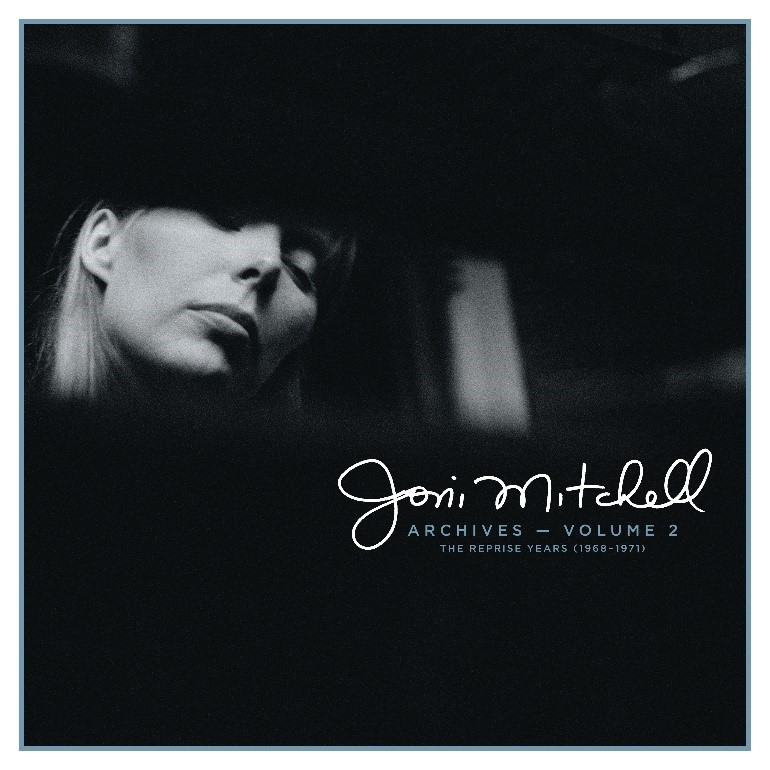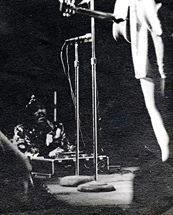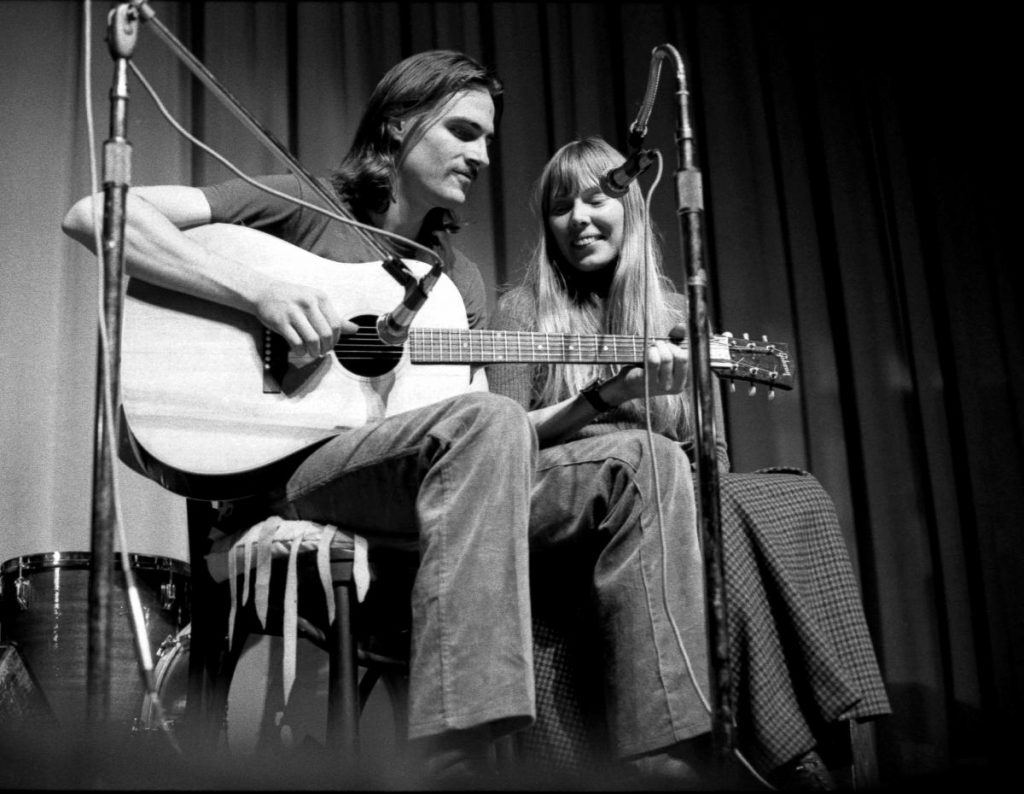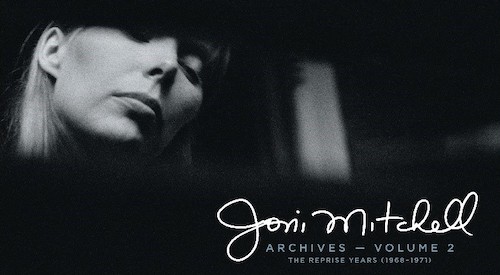 Once in a blue moon, a music artist or group evidences a growth spurt that’s so quick and impressive it can only be called astonishing. One example is the Beatles, who traveled the distance from “I Want to Hold Your Hand” to “Strawberry Fields Forever” and “Penny Lane” in a mere four years. Another is Bob Dylan, who went from covering traditional blues numbers in 1962 to stunningly original creations like “Desolation Row” just three years later.
Once in a blue moon, a music artist or group evidences a growth spurt that’s so quick and impressive it can only be called astonishing. One example is the Beatles, who traveled the distance from “I Want to Hold Your Hand” to “Strawberry Fields Forever” and “Penny Lane” in a mere four years. Another is Bob Dylan, who went from covering traditional blues numbers in 1962 to stunningly original creations like “Desolation Row” just three years later.
Joni Mitchell’s development during this same period seemed nearly as rapid. From 1963 to 1965, the years when she recorded the oldest tracks on last year’s Archives, Vol. 1: The Early Years (1963–1967), she mostly covered old folk songs, such as the traditional “House of the Rising Sun” and “John Hardy,” as well as Woody Guthrie’s “Pastures of Plenty” and “Deportee (Plane Crash at Los Gatos).” But by the middle of the decade, she was already debuting original material like “Urge for Going,” “The Circle Game” and “Both Sides, Now”—numbers that made clear she had a whole lot more to offer than well-sung interpretations.
Related: Our review of the first Archives box
You can hear her artistic growth continuing at a fast pace on Archives, Vol. 2: The Reprise Years (1968–1971). Like last year’s box, this is a five-CD set composed entirely of chronologically arranged, previously unreleased material. (The title notwithstanding, a handful of the numbers may have been recorded as early as the fall of 1967, prior to the release of her first album, and the liner notes list nothing as being created after 1970, though one track was broadcast in 1971 and a press release suggests that the last three songs may have come from that year.) While Archives, Vol. 1 contains many covers, this 122-track set, which showcases one of Mitchell’s most creative periods, includes only three. A well-illustrated 40-page booklet features a conversation with Cameron Crowe (who also spoke with the singer/songwriter for a Q&A featured in the previous box) in which she cites the Shirelles’ “Will You Love Me Tomorrow?” as an early influence.
Disc one consists mostly of demos, home recordings and outtakes from sessions for Mitchell’s 1968 debut album, Song to a Seagull. A few of these tunes, such as “The Dawntreader” and “I Had a King,” made it onto the released LP, but others didn’t show up until later. Among them: the acapella “The Fiddle and the Drum,” which is about as close as Mitchell ever got to political lyrics, and “Both Sides, Now.” Still others make their first appearance here—for example, “Jesus” and a song called “Midnight Cowboy,” which was intended for but ultimately not used in the film by that name. Also on this first disc: a couple of songs recorded live in March 1968 in Ann Arbor, Michigan.

The box devotes the lion’s share of disc two to a concert that same month in Ottawa that Jimi Hendrix—who turns out to have been a fan—recorded. This excellent and wide-ranging performance, which includes spoken intros to most of the songs, features material from Mitchell’s first album, such as “Michael from Mountains,” “Marcie” and “Night in the City,” as well as a taste of compositions that still hadn’t been released on disc, including Clouds’ “I Don’t Know Where I Stand” and the title track from 1970’s Ladies of the Canyon. The CD closes with a few studio efforts and four songs recorded live in September 1968 on BBC Radio in London.
If you want to hear what Mitchell sounded like in concert as the ’60s wrapped up, head straight for disc three, which consists almost entirely of her well-recorded February 1969 debut concert at New York’s Carnegie Hall. (“Almost” because the CD also fits in two tracks from a show the same month at the University of California at Berkeley.) The program includes beautifully sung versions of many of her early classics, such as “Morning Morgantown,” “The Circle Game” and “Both Sides, Now,” as well as a cover of Chet Powers’ “Get Together,” the Youngbloods hit, which Mitchell introduces as “a song I wish I wrote.”
Disc four adds one more number from the Carnegie Hall concert (“Urge for Going”) and offers demos and outtakes from sessions for Clouds, Ladies of the Canyon (“Woodstock”) and Blue (“A Case of You” and “California”), as well as performances from a concert in Saskatchewan, a Greenpeace benefit and a BBC appearance. Also here: a four-song 1969 set from The Dick Cavett Show that includes “Willy” (about Mitchell’s then-boyfriend Graham Nash) plus a brief, inconsequential conversation with Cavett.

The fifth and final disc embraces three tracks from the sessions for 1971’s Blue, but it is otherwise devoted to a November 1970 London concert that the BBC broadcast and that finds Mitchell drawing on her entire discography to date and previewing several numbers from Blue.
James Taylor, who appears on that album, joins her onstage for five of the London tracks: “A Case of You,” “California,” “For Free,” “The Circle Game” and Taylor’s “You Can Close Your Eyes.”
If you’re a Joni Mitchell fan, you probably bailed out of this review some paragraphs ago to go place your order for Archives, Vol. 2. If you’re a fan but still here, what are you waiting for?
Listen to Mitchell’s performance of “The Dawntreader” as recorded by Jimi Hendrix
[easy_sign_up title=”Sign up for the Best Classic Bands Newsletter”]

